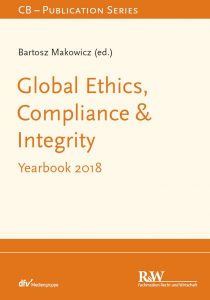Yearbook
| IDEA

In 2018 the first edition of the Yearbook of Global Ethics, Compliance and Integrity focusing on “Cross Cultural Compliance” was published as the result of a number of projects, various discussions, conferences, workshops and international congresses on Ethics, Compliance and Integrity. At these events, industry representatives (usually chief compliance officers) repeatedly complained about the considerable challenges they faced when attempting to implement internationally uniform and reliable compliance management systems (CMS) within a global organization or group structure. Certainly, methods and standards on how to determine and manage risks in individual countries do exist. However, social and cultural borders or foreign culture and values may make it difficult to ensure not only compliance but also the integrity of all members of an organization / cor-
poration.
To give the practitioners from all over the world a deep and complex overwiev in only one publication we desiced to publish this work every year covering by that all recent, actuall and current developments, challenges and stretegies in Ethics, Compliance and Integrity!
| ETHICS, COMPLIANCE AND INTEGRITY
Yet why is all this necessary? What does compliance have to do with values, ethics, culture and integrity? There is only one answer: everything! Human beings are at the center of any CMS along with their culture and underlying values. Human culture and values are formed by experiences, education, environment, religion and many other factors: these same values and culture determine whether a bribe has been accepted, environmental standards breached, interest rates manipulated or customers deceived. In all cases of non-compliance, values and the human culture therefore play a crucial role. In addition, human conduct
and the values directing it are the subject of ethics, a branch of philosophy. A CMS cannot function effectively without a sound understanding of ethics and thereby the values and culture that prevail in the area where it operates. Is it not enough then for people to internalise the culture and underlying values? No! They must also ensure that their outward acts consistently accord with these values. It is at this point that integrity comes into play. Compliance and integrity may therefore be regarded as two sides of the same coin, whereas ethics represents a specialist discipline within these two areas. This explains the first of the
two approaches in this work “Ethics, Compliance and Integrity”. The boundaries between these three terms are porous and complement each other.
| CONCEPT
The approach of this publication deals with challenges where the boundaries are somewhat clearer. Nowadays, when national economies are so closely interwoven, it would be wrong to adopt a single approach to Ethics, Compliance and Integrity; rather
developments should be viewed from a global perspective. Once a CMS has been implemented in one part of the organization or extended to a part located in a different culture, one must consider the differing ethical and moral rules, the culture and the values of its inhabitants. Otherwise, the system will be rejected and produce nothing more than undesirable side-effects, thereby resulting in attempts at evasion
We have therefore adopted in this book a rounded and self-contained concept which nevertheless retains a degree of flexibility. We will expand and update the work at regular intervals. We herewith invite interested authors and experts from the world of Ethics, Compliance and Integrity to submit their proposals for contributions. We will also ensure that similar works feature high-quality contributions in order to promote the development of Ethics, Compliance and Integrity in the long term.
